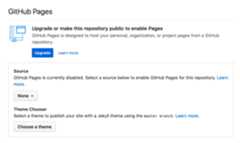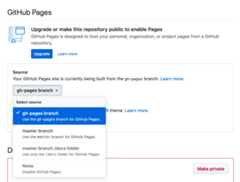GitHub Pages action
ActionsTags
(2)Note
See also the GitHub official GitHub Pages Action first.
This is aGitHub Action to deploy your static files toGitHub Pages.This deploy action can be combined simply and freely withStatic Site Generators. (Hugo, MkDocs, Gatsby, mdBook, Next, Nuxt, and so on.)
The next example step will deploy./public directory to the remotegh-pages branch.
-name:Deployuses:peaceiris/actions-gh-pages@v4with:github_token:${{ secrets.GITHUB_TOKEN }}publish_dir:./public
For newbies of GitHub Actions:Note that theGITHUB_TOKEN isNOT a personal access token.A GitHub Actions runner automatically creates aGITHUB_TOKEN secret to authenticate in your workflow.So, you can start to deploy immediately without any configuration.
Three tokens are supported.
| Token | Private repo | Public repo | Protocol | Setup |
|---|---|---|---|---|
github_token | ✅️ | ✅️ | HTTPS | Unnecessary |
deploy_key | ✅️ | ✅️ | SSH | Necessary |
personal_token | ✅️ | ✅️ | HTTPS | Necessary |
Notes: Actually, theGITHUB_TOKEN works for deploying to GitHub Pages but it has still some limitations.For the first deployment, we need to select thegh-pages branch or another branch on the repository settings tab.SeeFirst Deployment withGITHUB_TOKEN
All Actions runners: Linux (Ubuntu), macOS, and Windows are supported.
| runs-on | github_token | deploy_key | personal_token |
|---|---|---|---|
| ubuntu-22.04 | ✅️ | ✅️ | ✅️ |
| ubuntu-20.04 | ✅️ | ✅️ | ✅️ |
| ubuntu-latest | ✅️ | ✅️ | ✅️ |
| macos-latest | ✅️ | ✅️ | ✅️ |
| windows-latest | ✅️ | (2) | ✅️ |
- WIP, SeeIssue #87
✅️ GitHub Enterprise Server is supported above2.22.6.
Note that theGITHUB_TOKEN that is created by the runner might not inherently have push/publish privileges on GHES. You might need to create/request a technical user with write permissions to your target repository.
- Getting started
- Options
- ⭐️ Set Runner's Access Token
github_token - ⭐️ Set SSH Private Key
deploy_key - ⭐️ Set Personal Access Token
personal_token - ⭐️ Set Another GitHub Pages Branch
publish_branch - ⭐️ Source Directory
publish_dir - ⭐️ Deploy to Subdirectory
destination_dir - ⭐️ Filter publishing assets
exclude_assets - ⭐️ Add CNAME file
cname - ⭐️ Enable Built-in Jekyll
enable_jekyll - ⭐️ Allow empty commits
allow_empty_commit - ⭐️ Keeping existing files
keep_files - ⭐️ Deploy to external repository
external_repository - ⭐️ Force orphan
force_orphan - ⭐️ Set Git username and email
- ⭐️ Set custom commit message
- ⭐️ Create Git tag
- ⭐️ Set Runner's Access Token
- Tips and FAQ
- Examples
- License
- Maintainer
Add your workflow file.github/workflows/gh-pages.yml and push it to your remote default branch.
Here is an example workflow for Hugo.
name:GitHub Pageson:push:branches: -main# Set a branch name to trigger deploymentpull_request:jobs:deploy:runs-on:ubuntu-22.04permissions:contents:writeconcurrency:group:${{ github.workflow }}-${{ github.ref }}steps: -uses:actions/checkout@v4with:submodules:true# Fetch Hugo themes (true OR recursive)fetch-depth:0# Fetch all history for .GitInfo and .Lastmod -name:Setup Hugouses:peaceiris/actions-hugo@v2with:hugo-version:'0.110.0' -name:Buildrun:hugo --minify -name:Deployuses:peaceiris/actions-gh-pages@v4# If you're changing the branch from main,# also change the `main` in `refs/heads/main`# below accordingly.if:github.ref == 'refs/heads/main'with:github_token:${{ secrets.GITHUB_TOKEN }}publish_dir:./public
| Actions log overview | GitHub Pages log |
|---|---|
 |  |
This option is forGITHUB_TOKEN, not a personal access token.
A GitHub Actions runner automatically creates aGITHUB_TOKEN secret to use in your workflow. You can use theGITHUB_TOKEN to authenticate in a workflow run.
-name:Deployuses:peaceiris/actions-gh-pages@v4with:github_token:${{ secrets.GITHUB_TOKEN }}publish_dir:./public
For more details aboutGITHUB_TOKEN:Automatic token authentication - GitHub Docs
ReadCreate SSH Deploy Key, create your SSH deploy key, and set thedeploy_key option like the following.
-name:Deployuses:peaceiris/actions-gh-pages@v4with:deploy_key:${{ secrets.ACTIONS_DEPLOY_KEY }}publish_dir:./public
Generate a personal access token (repo) and add it to Secrets asPERSONAL_TOKEN, it works as well asACTIONS_DEPLOY_KEY.
-name:Deployuses:peaceiris/actions-gh-pages@v4with:personal_token:${{ secrets.PERSONAL_TOKEN }}publish_dir:./public
Set a branch name to use as GitHub Pages branch.The default isgh-pages.
-name:Deployuses:peaceiris/actions-gh-pages@v4with:github_token:${{ secrets.GITHUB_TOKEN }}publish_branch:your-branch# default: gh-pages
A source directory to deploy to GitHub Pages. The default ispublic.Only the contents of this dir are pushed to GitHub Pages branch,gh-pages by default.
-name:Deployuses:peaceiris/actions-gh-pages@v4with:github_token:${{ secrets.GITHUB_TOKEN }}publish_dir:./out# default: public
This feature is on beta.Any feedback is welcome atIssue #324
A destination subdirectory on a publishing branch. The default is empty.
-name:Deployuses:peaceiris/actions-gh-pages@v4with:github_token:${{ secrets.GITHUB_TOKEN }}destination_dir:subdir
This feature is on beta.Any feedback is welcome atIssue #163
Set files or directories to exclude from publishing assets.The default is.github.Values should be split with a comma.
-name:Deployuses:peaceiris/actions-gh-pages@v4with:github_token:${{ secrets.GITHUB_TOKEN }}exclude_assets:'.github,exclude-file1,exclude-file2'
Setexclude_assets to empty for including the.github directory to deployment assets.
-name:Deployuses:peaceiris/actions-gh-pages@v4with:deploy_key:${{ secrets.ACTIONS_DEPLOY_KEY }}# Recommended for this usage# personal_token: ${{ secrets.PERSONAL_TOKEN }} # An alternative# github_token: ${{ secrets.GITHUB_TOKEN }} # This does not work for this usageexclude_assets:''
Theexclude_assets option supports glob patterns.
-name:Deployuses:peaceiris/actions-gh-pages@v4with:github_token:${{ secrets.GITHUB_TOKEN }}exclude_assets:'.github,exclude-file.txt,exclude-dir/**.txt'
To add theCNAME file, we can set thecname option.Alternatively, put yourCNAME file into yourpublish_dir. (e.g.public/CNAME)
For more details about theCNAME file, read the official documentation:Managing a custom domain for your GitHub Pages site - GitHub Docs
-name:Deployuses:peaceiris/actions-gh-pages@v4with:github_token:${{ secrets.GITHUB_TOKEN }}publish_dir:./publiccname:github.com
If you want GitHub Pages to process your site with the static site generator Jekyll, setenable_jekyll to true.
By default, this action signals to GitHub Pages that the site shall not be processed with Jekyll. This is done by adding an empty.nojekyll file on your publishing branch. When that file already exists, this action does nothing.
Bypassing Jekyll makes the deployment faster and is necessary if you are deploying files or directories that start with underscores, since Jekyll considers these to be special resources and does not copy them to the final site. You only need to setenable_jekyll to true when you want to deploy a Jekyll-powered website and let GitHub Pages do the Jekyll processing.
-name:Deployuses:peaceiris/actions-gh-pages@v4with:github_token:${{ secrets.GITHUB_TOKEN }}publish_dir:./publicenable_jekyll:true
For more details about.nojekyll:Bypassing Jekyll on GitHub Pages - The GitHub Blog
By default, a commit will not be generated when no file changes. If you want to allow an empty commit, set the optional parameterallow_empty_commit totrue.
For example:
-name:Deployuses:peaceiris/actions-gh-pages@v4with:github_token:${{ secrets.GITHUB_TOKEN }}publish_dir:./publicallow_empty_commit:true
By default, existing files in the publish branch (or only indestination_dir if given) will be removed. If you want the action to add new files but leave existing ones untouched, set the optional parameterkeep_files totrue.
Note that users who are using a Static Site Generator do not need this option in most cases. Please reconsider your project structure and building scripts, or use a built-in feature of a Static Site Generator before you enable this flag.
For example:
-name:Deployuses:peaceiris/actions-gh-pages@v4with:github_token:${{ secrets.GITHUB_TOKEN }}publish_dir:./publickeep_files:true
With the v3, this option does not support working with the force_orphan option. The next major release (version 4) will support this.Seethe issue #455
By default, your files are published to the repository which is running this action.If you want to publish to another repository on GitHub, set the environment variableexternal_repository to<username>/<external-repository>.
For example:
-name:Deployuses:peaceiris/actions-gh-pages@v4with:deploy_key:${{ secrets.ACTIONS_DEPLOY_KEY }}external_repository:username/external-repositorypublish_branch:your-branch# default: gh-pagespublish_dir:./public
You can usedeploy_key orpersonal_token.When you usedeploy_key, set your private key to the repository which includes this action and set your public key to your external repository.
Note thatGITHUB_TOKEN has no permission to access to external repositories. Please create a personal access token and set it topersonal_token likepersonal_token: ${{ secrets.PERSONAL_TOKEN }}.
Use case:
A GitHub Free Plan account cannot use the GitHub Pages in a private repository. To make your source contents private and deploy it with the GitHub Pages, you can deploy your site from a private repository to a public repository using this option.
peaceiris/homepage: A private repository running this action withexternal_repository: peaceiris/peaceiris.github.iopeaceiris/peaceiris.github.io: A public repository using GitHub Pages
We can set theforce_orphan: true option.This allows you to make your publish branch with only the latest commit.
-name:Deployuses:peaceiris/actions-gh-pages@v4with:github_token:${{ secrets.GITHUB_TOKEN }}publish_dir:./publicforce_orphan:true
Set customgit config user.name andgit config user.email.A commit is always created with the same user.
-name:Deployuses:peaceiris/actions-gh-pages@v4with:github_token:${{ secrets.GITHUB_TOKEN }}publish_dir:./publicuser_name:'github-actions[bot]'user_email:'github-actions[bot]@users.noreply.github.com'
Set a custom commit message.When we create a commit with a messagedocs: Update some post, a deployment commit will be generated with a messagedocs: Update some post ${GITHUB_SHA}.
-name:Deployuses:peaceiris/actions-gh-pages@v4with:github_token:${{ secrets.GITHUB_TOKEN }}publish_dir:./publiccommit_message:${{ github.event.head_commit.message }}
To set a full custom commit message without a triggered commit hash,use thefull_commit_message option instead of thecommit_message option.
-name:Deployuses:peaceiris/actions-gh-pages@v4with:github_token:${{ secrets.GITHUB_TOKEN }}publish_dir:./publicfull_commit_message:${{ github.event.head_commit.message }}
Here is an example workflow.
name:GitHub Pageson:push:branches: -maintags: -'v*.*.*'jobs:deploy:runs-on:ubuntu-22.04permissions:contents:writeconcurrency:group:${{ github.workflow }}-${{ github.ref }}steps: -uses:actions/checkout@v4 -name:Some build -name:Prepare tagid:prepare_tagif:startsWith(github.ref, 'refs/tags/')run:| echo "DEPLOY_TAG_NAME=deploy-${TAG_NAME}" >> "${GITHUB_OUTPUT}" -name:Deployuses:peaceiris/actions-gh-pages@v4with:github_token:${{ secrets.GITHUB_TOKEN }}publish_dir:./publictag_name:${{ steps.prepare_tag.outputs.DEPLOY_TAG_NAME }}tag_message:'Deployment ${{ github.ref_name }}'
Commands on a local machine.
$# On a main branch$git tag -a"v1.2.3" -m"Release v1.2.3"$git push origin"v1.2.3"$# After deployment$git fetch origin$git tagdeploy-v1.2.3 # Tag on the gh-pages branchv1.2.3 # Tag on the main branch
Generate your deploy key with the following command.
ssh-keygen -t rsa -b 4096 -C"$(git config user.email)" -f gh-pages -N""
You will get 2 files:
gh-pages.pubis a public keygh-pagesis a private key
Next, Go toRepository Settings
- Go toDeploy Keys and add your public key with theAllow write access
- Go toSecrets and add your private key as
ACTIONS_DEPLOY_KEY
| Add your public key | Success |
|---|---|
 |  |
| Add your private key | Success |
|---|---|
 |  |
TheGITHUB_TOKEN has limitations for the first deployment so we have to select the GitHub Pages branch on the repository settings tab. After that, do the second deployment like the following pictures.
| First deployment failed | Go to the settings tab |
|---|---|
 |  |
| Select branch | Deploying again and succeed |
|---|---|
 |  |
If the action fails to push the commit or tag with the following error:
/usr/bin/git push origin gh-pagesremote: Write access to repository not granted.fatal: unable to access 'https://github.com/username/repository.git/': The requested URL returned error: 403Error: Action failed with "The process '/usr/bin/git' failed with exit code 128"
Please add the write permission to thepermissions.contents in a workflow/job.
permissions:contents:write
Alternatively, you canconfigure the defaultGITHUB_TOKEN permissions by selecting read and write permissions.
We recommend you to use the latest and specific release of this action for stable CI/CD.It is useful to watch this repository (release only) to check thelatest release of this action.
For continuous updating, we can use the GitHub native Dependabot.Here is an example configuration of the bot. The config file is located in.github/dependabot.yml.
version:2updates:-package-ecosystem:"github-actions"directory:"/"schedule:interval:"daily"labels: -"CI/CD"commit-message:prefix:ci
See the official documentation for more details about the Dependabot:Keeping your dependencies updated automatically - GitHub Docs
For deploying regularly, we can set theon.schedule workflow trigger.SeeScheduled events | Events that trigger workflows - GitHub Docs
For deploying manually, we can set theon.workflow_dispatch workflow trigger.SeeManual eventsworkflow_dispatch | Events that trigger workflows - GitHub Docs
name:GitHub Pageson:push:branches: -mainschedule: -cron:"22 22 * * *"workflow_dispatch:jobs:deploy:runs-on:ubuntu-22.04permissions:contents:writeconcurrency:group:${{ github.workflow }}-${{ github.ref }}steps:...
Our project builds and provides build assets only when creating a release. This is to prevent the user from executing this action with a specific branch (like main). For example, if we maintain build assets in the main branch and users use this action as follows, a major release including breaking changes will break the CI workflow of the users silently.
-uses:peaceiris/actions-gh-pages@main# Bad example!with:github_token:${{ secrets.GITHUB_TOKEN }}publish_dir:./public
In this project, a major tag (e.g. v3) is guaranteed to contain no breaking changes. But, we recommend using a tag or a commit hash for the stability of your workflows.
-uses:peaceiris/actions-gh-pages@v4.0.0# tag: Betterwith:github_token:${{ secrets.GITHUB_TOKEN }}publish_dir:./public
-uses:peaceiris/actions-gh-pages@373f7f263a76c20808c831209c920827a82a2847# commit hash of v3.9.3: Best!with:github_token:${{ secrets.GITHUB_TOKEN }}publish_dir:./public
For verifying the release asset, we can use the following commands.
git clone https://github.com/peaceiris/actions-gh-pages.gitcd ./actions-gh-pagesgit checkout v3.9.3nvm installnvm usenpm i -g npmnpm cinpm run buildgit diff ./lib/index.js# We will get zero exit code
hexo,vuepress,react-static,gridsome,create-react-app and so on.Please check where your output directory is before pushing your workflow.e.g.create-react-app requirespublish_dir to be set to./build
Premise: Dependencies are managed bypackage.json andpackage-lock.json
name:GitHub Pageson:push:branches: -mainpull_request:jobs:deploy:runs-on:ubuntu-22.04permissions:contents:writeconcurrency:group:${{ github.workflow }}-${{ github.ref }}steps: -uses:actions/checkout@v4 -name:Setup Nodeuses:actions/setup-node@v4with:node-version:'24' -name:Cache dependenciesuses:actions/cache@v4with:path:~/.npmkey:${{ runner.os }}-node-${{ hashFiles('**/package-lock.json') }}restore-keys:| ${{ runner.os }}-node- -run:npm ci -run:npm run build -name:Deployuses:peaceiris/actions-gh-pages@v4if:github.ref == 'refs/heads/main'with:github_token:${{ secrets.GITHUB_TOKEN }}publish_dir:./public
An example forGatsby (Gatsby.js) project withgatsby-starter-blog
name:GitHub Pageson:push:branches: -mainpull_request:jobs:deploy:runs-on:ubuntu-22.04permissions:contents:writeconcurrency:group:${{ github.workflow }}-${{ github.ref }}steps: -uses:actions/checkout@v4 -name:Setup Nodeuses:actions/setup-node@v4with:node-version:'24' -name:Cache dependenciesuses:actions/cache@v4with:path:~/.npmkey:${{ runner.os }}-node-${{ hashFiles('**/package-lock.json') }}restore-keys:| ${{ runner.os }}-node- -run:npm ci -run:npm run format -run:npm run test -run:npm run build -name:Deployuses:peaceiris/actions-gh-pages@v4if:github.ref == 'refs/heads/main'with:github_token:${{ secrets.GITHUB_TOKEN }}publish_dir:./public
An example forNext.js (React.js) project withcreate-next-app
name:GitHub Pageson:push:branches: -mainpull_request:jobs:deploy:runs-on:ubuntu-22.04permissions:contents:writeconcurrency:group:${{ github.workflow }}-${{ github.ref }}steps: -uses:actions/checkout@v4 -name:Setup Nodeuses:actions/setup-node@v4with:node-version:'24' -name:Get yarn cacheid:yarn-cacherun:echo "YARN_CACHE_DIR=$(yarn cache dir)" >> "${GITHUB_OUTPUT}" -name:Cache dependenciesuses:actions/cache@v4with:path:${{ steps.yarn-cache.outputs.YARN_CACHE_DIR }}key:${{ runner.os }}-yarn-${{ hashFiles('**/yarn.lock') }}restore-keys:| ${{ runner.os }}-yarn- -run:yarn install --frozen-lockfile -run:yarn build -run:yarn export -name:Deployuses:peaceiris/actions-gh-pages@v4if:github.ref == 'refs/heads/main'with:github_token:${{ secrets.GITHUB_TOKEN }}publish_dir:./out
An example forNuxt.js (Vue.js) project withcreate-nuxt-app
name:GitHub Pageson:push:branches: -mainpull_request:jobs:deploy:runs-on:ubuntu-22.04permissions:contents:writeconcurrency:group:${{ github.workflow }}-${{ github.ref }}steps: -uses:actions/checkout@v4 -name:Setup Nodeuses:actions/setup-node@v4with:node-version:'24' -name:Cache dependenciesuses:actions/cache@v4with:path:~/.npmkey:${{ runner.os }}-node-${{ hashFiles('**/package-lock.json') }}restore-keys:| ${{ runner.os }}-node- -run:npm ci -run:npm test -run:npm run generate -name:deployuses:peaceiris/actions-gh-pages@v4if:github.ref == 'refs/heads/main'with:github_token:${{ secrets.GITHUB_TOKEN }}publish_dir:./dist
An example workflow forDocusaurus.
npx @docusaurus/init@next init website classic is useful to create a new Docusaurus project.
# .github/workflows/deploy.ymlname:GitHub Pageson:push:branches: -mainpaths: -'.github/workflows/deploy.yml' -'website/**'pull_request:jobs:deploy:runs-on:ubuntu-22.04permissions:contents:writeconcurrency:group:${{ github.workflow }}-${{ github.ref }}defaults:run:working-directory:websitesteps: -uses:actions/checkout@v4 -name:Setup Nodeuses:actions/setup-node@v4with:node-version:'24' -name:Get yarn cacheid:yarn-cacherun:echo "YARN_CACHE_DIR=$(yarn cache dir)" >> "${GITHUB_OUTPUT}" -name:Cache dependenciesuses:actions/cache@v4with:path:${{ steps.yarn-cache.outputs.YARN_CACHE_DIR }}key:${{ runner.os }}-website-${{ hashFiles('**/yarn.lock') }}restore-keys:| ${{ runner.os }}-website- -run:yarn install --frozen-lockfile -run:yarn build -name:Deployuses:peaceiris/actions-gh-pages@v4if:github.ref == 'refs/heads/main'with:github_token:${{ secrets.GITHUB_TOKEN }}publish_dir:./website/build
pelican,MkDocs,sphinx, and so on.
Premise: Dependencies are managed byrequirements.txt
name:GitHub Pageson:push:branches: -mainpull_request:jobs:deploy:runs-on:ubuntu-22.04permissions:contents:writeconcurrency:group:${{ github.workflow }}-${{ github.ref }}steps: -uses:actions/checkout@v4 -name:Setup Pythonuses:actions/setup-python@v5with:python-version:'3.13' -name:Upgrade piprun:| # install pip=>20.1 to use "pip cache dir" python3 -m pip install --upgrade pip -name:Get pip cache dirid:pip-cacherun:echo "dir=$(pip cache dir)" >> $GITHUB_OUTPUT -name:Cache dependenciesuses:actions/cache@v4with:path:${{ steps.pip-cache.outputs.dir }}key:${{ runner.os }}-pip-${{ hashFiles('**/requirements.txt') }}restore-keys:| ${{ runner.os }}-pip- -name:Install dependenciesrun:python3 -m pip install -r ./requirements.txt -run:mkdocs build -name:Deployuses:peaceiris/actions-gh-pages@v4if:github.ref == 'refs/heads/main'with:github_token:${{ secrets.GITHUB_TOKEN }}publish_dir:./site
An example GitHub Actions workflow to deployrust-lang/mdBook site to GitHub Pages.
name:GitHub Pageson:push:branches: -mainpull_request:jobs:deploy:runs-on:ubuntu-22.04permissions:contents:writeconcurrency:group:${{ github.workflow }}-${{ github.ref }}steps: -uses:actions/checkout@v4 -name:Setup mdBookuses:peaceiris/actions-mdbook@v1with:mdbook-version:'0.4.8'# mdbook-version: 'latest' -run:mdbook build -name:Deployuses:peaceiris/actions-gh-pages@v4if:github.ref == 'refs/heads/main'with:github_token:${{ secrets.GITHUB_TOKEN }}publish_dir:./book
Hint: you may want to publish your rustdocs. And use relative links to it from the md docs, and have them checked bymdbook.Then, according to thedoc, you may put./target/doc/to your./book/src dir before youmdbook build and then it will end up in./book/html/ and in your Github Pages.
An example workflow forFlutter web project.
name:GitHub Pageson:push:branches: -mainpull_request:jobs:deploy:runs-on:ubuntu-22.04permissions:contents:writeconcurrency:group:${{ github.workflow }}-${{ github.ref }}steps: -uses:actions/checkout@v4 -name:Setup Flutterrun:| git clone https://github.com/flutter/flutter.git --depth 1 -b beta _flutter echo "${GITHUB_WORKSPACE}/_flutter/bin" >> ${GITHUB_PATH} -name:Installrun:| flutter config --enable-web flutter pub get -name:Buildrun:flutter build web -name:Deployuses:peaceiris/actions-gh-pages@v4if:github.ref == 'refs/heads/main'with:github_token:${{ secrets.GITHUB_TOKEN }}publish_dir:./build/web
An example workflow forElm.
name:GitHub Pageson:push:branches: -mainpull_request:jobs:deploy:runs-on:ubuntu-22.04permissions:contents:writeconcurrency:group:${{ github.workflow }}-${{ github.ref }}steps: -uses:actions/checkout@v4 -name:Setup Nodeuses:actions/setup-node@v4with:node-version:'24' -name:Setup Elmrun:npm install elm --global -name:Makerun:elm make --optimize src/Main.elm -name:Move filesrun:| mkdir ./public mv ./index.html ./public/# If you have non-minimal setup with some assets and separate html/js files,# provide --output=<output-file> option for `elm make` and remove this step -name:Deployuses:peaceiris/actions-gh-pages@v4if:github.ref == 'refs/heads/main'with:github_token:${{ secrets.GITHUB_TOKEN }}publish_dir:./public
An example workflow forJohnSundell/Publish.
name:GitHub Pageson:push:branches: -mainpull_request:jobs:deploy:runs-on:macos-latestconcurrency:group:${{ github.workflow }}-${{ github.ref }}steps: -uses:actions/checkout@v4 -uses:actions/cache@v4with:path:| ~/Publish_build .buildkey:${{ runner.os }}-spm-${{ hashFiles('**/Package.resolved') }}restore-keys:| ${{ runner.os }}-spm- -name:Setup JohnSundell/Publishrun:| cd ${HOME} export PUBLISH_VERSION="0.7.0" git clone https://github.com/JohnSundell/Publish.git cd ./Publish && git checkout ${PUBLISH_VERSION} mv ~/Publish_build .build ||true swift build -c release cp -r .build ~/Publish_build ||true echo "${HOME}/Publish/.build/release" >> ${GITHUB_PATH} -run:publish-cli generate -name:Deploy to GitHub Pagesuses:peaceiris/actions-gh-pages@v4if:github.ref == 'refs/heads/main'with:github_token:${{ secrets.GITHUB_TOKEN }}publish_dir:./Output
GitHub Pages action is not certified by GitHub. It is provided by a third-party and is governed by separate terms of service, privacy policy, and support documentation.
About
Tags
(2)GitHub Pages action is not certified by GitHub. It is provided by a third-party and is governed by separate terms of service, privacy policy, and support documentation.

